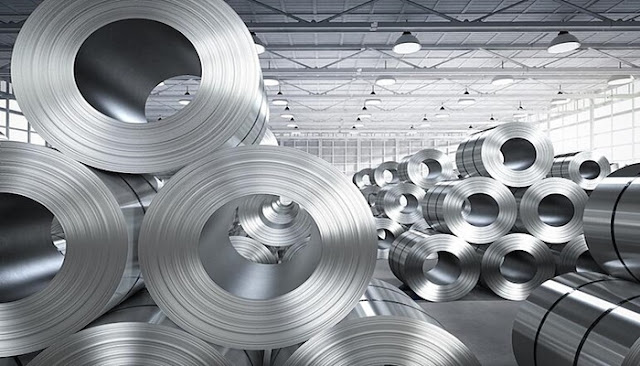When you mention pressure vessels and metals, it's a complex topic. The metals are great for vessel making, recycling, codes, usage, standards and safety. To understand the application of these metals on pressure vessels, you need to know the constituents. Here are all the details about these types of metal and their importance in pressure vessel making.
Overview of Non-ferrous Metals:
Non-ferrous metals are more costly than ferrous metals. They are common in the steel and iron industries. Examples of its application are in pressure vessel manufacturing companies in India. They possess unique properties that make them favourable for most applications. Some of the properties are they are lightweight, non-magnetic and have a higher conductivity. In addition, they are resistant to corrosion.
The commonly used non-ferrous metals are:
● Lead: The metal has a low melting point and low tensile strength. Suitable for making batteries, soldering and power cables.
● Copper: This metal is malleable, ductile, and a good conductor of heat and electricity. Suitable for electrical wiring.
● Aluminium: It's light and easy to machine and weld. They are commonly used in manufacturing food cans, aircraft, cars and kitchen utensils.
Overview of Ferrous Metals:
These refer to metals that have iron in them. They are used for their tensile strength and durability. These metals are commonly used in the building, large-scale piping and engineering industries—some examples and uses of ferrous and non-ferrous metals.
Some of the common examples include
● Wrought iron: It's different from other ferrous metals. It's special because it resists oxidation and corrosion. Mostly used for fencing and railing.
● Steel: Famous for its machinability and toughness. Commonly used in construction and by heavy equipment manufacturers.
● Cast Iron: The metal is hard and resistant to wear. It's suitable for various applications like machine tools, water pipes and cookware.
Characteristics of Ferrous & Non-Ferrous Metals
Here are the properties of these types of metals that make them special. They include:
→ Rust and Corrosion Resistance:
Non-ferrous metals do not have iron; thus, they have a high natural resistance to rust and corrosion. These metals are great for making things like gutters and roofing. In addition, it's also used by heavy equipment manufacturers in India for its special qualities.
On the other hand, ferrous metals have high carbon content. This makes them prone to rusting when exposed to the elements. But for, wrought iron, which is a ferrous metal, is resistant to rust because it has less iron.
→ Magnetic Properties:
Non-ferrous metals don't have magnetic properties. o, they are suitable to use in electronic applications and wiring. On the other hand, ferrous metals have magnetic properties. This makes them suitable for manufacturing motor and electrical appliances. Surprisingly, the application of ferrous metals allows you to stick reminders and shopping lists on your fridge.
→ Weight
Non-ferrous metals are lighter than ferrous metals.
→ Cost
Regarding cost, non-ferrous metals are more costly than ferrous metals. The reason is they are in high demand compared to ferrous metals.
→ Recycling
Both of these metals are recyclable. However, non-ferrous metals can be recycled multiple times because they don't degrade or lose chemical properties. But for their counterparts, they have to be melted, purified and compacted into solid blocks.
Application of These Metals in Pressure Vessel Making
Non-ferrous metals are very scarce, and they need to be recycled. However, it's important to do metal recycling due to the following reasons:
● Reduces waste that goes to landfills
● Lowers greenhouse gas emissions
● Preserves the environment and saves energy on natural resource extraction.
Making of Pressure Vessels
Pressure vessels are things you see or use every day. For example, you can see them when you open your medicine cabinet or pass by a plant. It can be an aerosol, cooking gas cylinder or gas storage vessel like in refineries. These vessels are made to hold gasses or liquids under differential pressures. Note that you need to be careful with differential pressure as it can be riskier to deal with than regulated pressure. It means the making of pressure vessels must adhere to the set processes and the right materials.
Most pressure vessels manufacturing companies in India use ferrous metal. The reason behind this is they have many parts welded together, and some parts can be affected during the welding process. Therefore, manufacturers should follow the right and strict guidelines when working these two metals during pressure vessel making.
You must ensure the steel can take a high impact and maintain integrity. It's vital to strictly follow these regulations for pressure vessels in low temperatures. Due to the cold temperatures, they have to be corrosion-resistant and durable.
To achieve this, include a non-ferrous lining in pressure vessels to prevent leaks and add surface protection. The lining you add can also help carry the load of pressure.
Pressure vessels are things that you come across every day. However, they can be dangerous if safety standards and guidelines are not followed. Although the two metals are different, they come together for their properties to make the pressure cylinders. It makes it easier and safe to use them every day. It would be difficult to live without these two precious metals.

No comments:
Post a Comment